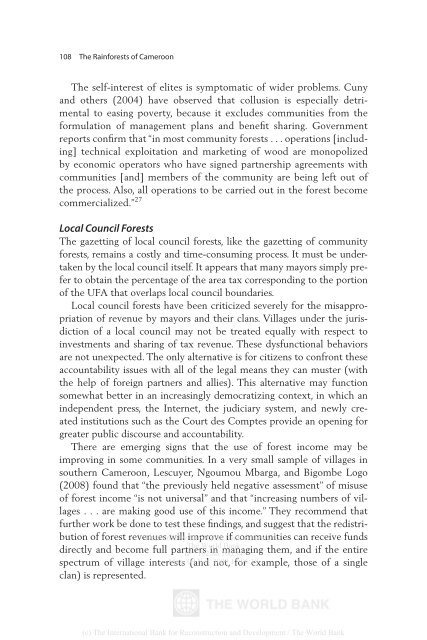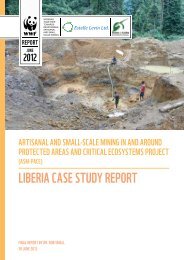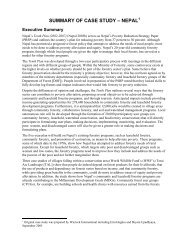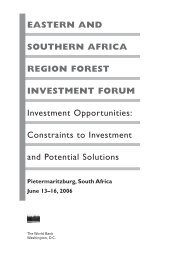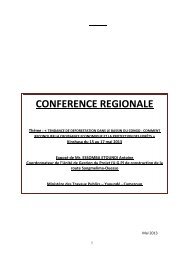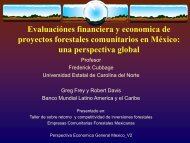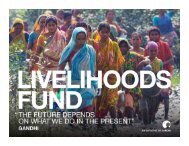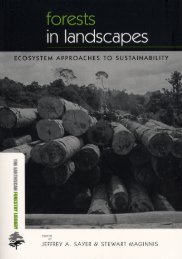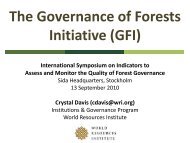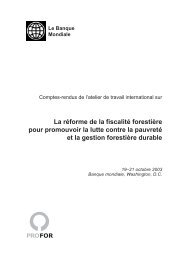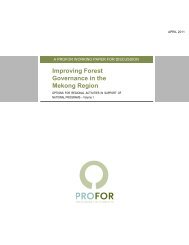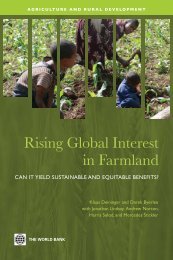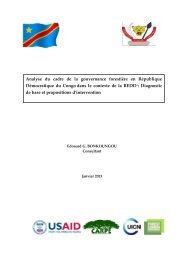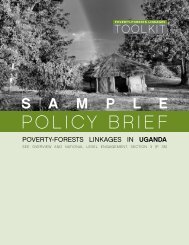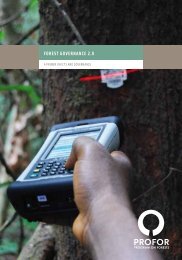The Rainforests of Cameroon - PROFOR
The Rainforests of Cameroon - PROFOR
The Rainforests of Cameroon - PROFOR
- No tags were found...
You also want an ePaper? Increase the reach of your titles
YUMPU automatically turns print PDFs into web optimized ePapers that Google loves.
108 <strong>The</strong> <strong>Rainforests</strong> <strong>of</strong> <strong>Cameroon</strong><strong>The</strong> self-interest <strong>of</strong> elites is symptomatic <strong>of</strong> wider problems. Cunyand others (2004) have observed that collusion is especially detrimentalto easing poverty, because it excludes communities from theformulation <strong>of</strong> management plans and benefit sharing. Governmentreports confirm that “in most community forests . . . operations [including]technical exploitation and marketing <strong>of</strong> wood are monopolizedby economic operators who have signed partnership agreements withcommunities [and] members <strong>of</strong> the community are being left out <strong>of</strong>the process. Also, all operations to be carried out in the forest becomecommercialized.” 27Local Council Forests<strong>The</strong> gazetting <strong>of</strong> local council forests, like the gazetting <strong>of</strong> communityforests, remains a costly and time-consuming process. It must be undertakenby the local council itself. It appears that many mayors simply preferto obtain the percentage <strong>of</strong> the area tax corresponding to the portion<strong>of</strong> the UFA that overlaps local council boundaries.Local council forests have been criticized severely for the misappropriation<strong>of</strong> revenue by mayors and their clans. Villages under the jurisdiction<strong>of</strong> a local council may not be treated equally with respect toinvestments and sharing <strong>of</strong> tax revenue. <strong>The</strong>se dysfunctional behaviorsare not unexpected. <strong>The</strong> only alternative is for citizens to confront theseaccountability issues with all <strong>of</strong> the legal means they can muster (withthe help <strong>of</strong> foreign partners and allies). This alternative may functionsomewhat better in an increasingly democratizing context, in which anindependent press, the Internet, the judiciary system, and newly createdinstitutions such as the Court des Comptes provide an opening forgreater public discourse and accountability.<strong>The</strong>re are emerging signs that the use <strong>of</strong> forest income may beimproving in some communities. In a very small sample <strong>of</strong> villages insouthern <strong>Cameroon</strong>, Lescuyer, Ngoumou Mbarga, and Bigombe Logo(2008) found that “the previously held negative assessment” <strong>of</strong> misuse<strong>of</strong> forest income “is not universal” and that “increasing numbers <strong>of</strong> villages. . . are making good use <strong>of</strong> this income.” <strong>The</strong>y recommend thatfurther work be done to test these findings, and suggest that the redistribution<strong>of</strong> forest revenues Delivered will by improve <strong>The</strong> World Bank if communities e-library to: can receive funds<strong>The</strong> World Bankdirectly and become full partners IP : 192.86.100.34 in managing them, and if the entirespectrum <strong>of</strong> village interests Mon, 09 (and Nov 2009 not, 17:06:18 for example, those <strong>of</strong> a singleclan) is represented.(c) <strong>The</strong> International Bank for Reconstruction and Development / <strong>The</strong> World Bank


